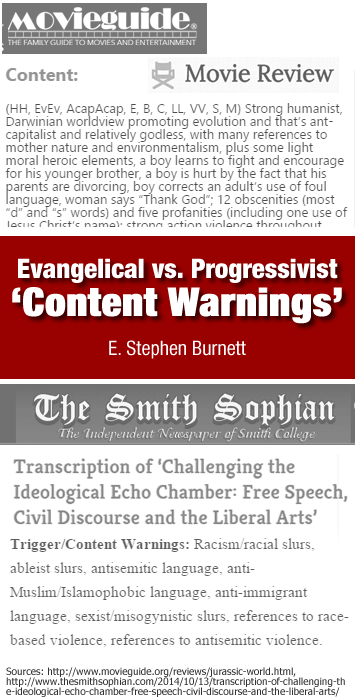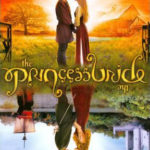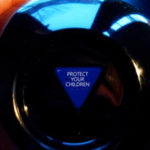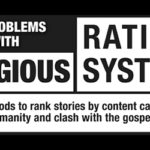Evangelical Vs. Progressivist Content Warnings 101
 Lately I’ve found that we American evangelicals, bless our hearts, may have managed to set a cultural trend. Unfortunately I’m not sure we can take pride in this accomplishment.
Lately I’ve found that we American evangelicals, bless our hearts, may have managed to set a cultural trend. Unfortunately I’m not sure we can take pride in this accomplishment.
I’m referring to the phenomenon of including content disclaimers called “trigger warnings” or “content warnings” before a story, article, or other bit of culture that has words, ideas, or other elements that an individual or group—real or imaginary—may find objectionable.
From what I’ve read, content warnings are becoming quite the fad, not just among authors who want to show compassion to victims of abuse but among groups, institutions and writers who are merely finding a hipper-sounding way to enforce what was once called “political correctness.” It’s not just therapists doing this, but believers in progressivism.1
How do I cast tongue-in-cheek blame on Christians for this? Because if I didn’t know better I would say that some of our movie-review sites, with their well-meant yet infamous counts of cusswords and other Objectionable Content, started this whole notion in the first place.
Evangelical content warnings are based on popular-culture stories and songs, usually TV and movies. We send out specially trained reviewers (sometimes assuming their level of spiritual maturity is unattainable by Average Joe Christian) to analyze movies’ worldviews, count cusswords, and determine whether the film is age-appropriate or “family friendly.” Reviewers at sites like Plugged In are much better at this. Reviewers at MovieGuide will sometimes surprise you with their astuteness, but still reduce a movie’s “worldview” and content to a series of literal engineering-like secret code letters like “EvEv” and “AcapAcap.”
Progressivist content warnings are found in more nonfiction contexts such as articles, speeches, and now apparently academic transcripts of panel discussions about free speech. While evangelicals say things like “[includes] many references to mother nature and environmentalism,” progressivist believers warn impressionable readers against “ableist slurs” or even cautionary references to violence against particular ethnic groups.
What do these two different styles of content warnings have in common?
Here I must be careful, not to avoid “triggering” readers but to avoid alarmist conclusions.
First, it may be the case that the silliest instances of these “warnings” are rare and overblown by often-alarmist clickbait websites that have often-political profit motives.
Second, many people intend content/trigger warnings for good reasons. For example, in the Christian community I’ve seen articles that describe in some detail instances of sexual or spiritual abuse. These are absolutely necessary to root out potential abusers, but also require disclaimers because true victims should absolutely take care before reading.
Assuming the best, both are intended to keep weak people from getting hurt. That’s good.
Evangelical application: We do need help within the church (local church first, and then organizations) to help us honor God and pursue holiness in our story and song choices. Usually we’re weak in certain areas. Children should not know about sex before certain (variable) ages. You may be able to watch Game of Thrones and fast-forward past the porn parts, while I don’t want to go near the thing because I would be tempted to gaze. By all means, let’s have content warnings for these stories and songs to keep us from stumbling into temptations we’re not yet mature enough to handle. That’s part of being Christ’s body.
Progressivist application: Why assume we’ve nothing to learn here? I think it’s fine to respect some of the impulse behind non-evangelical content warnings. We do need to be aware of how our words (or certain symbols, like flags) can hurt others. Who do need to take care lest we “trigger” people who have suffered abuse or violence. If that seems odd to us, we can consider (this is a very tame example) being afflicted by nausea and having to listen to someone discuss greasy Philadelphia cheesesteak sub sandwiches or something.
But we cannot stop after only saying content warnings are “well-intended.” We must be firmer about the purpose of content warnings—and flagrant deviations from that purpose.
Content warnings are at best temporary safeguards for those who may be hurt by content. So why in the world does anyone—Christians and progressivists alike—pretend that our content warnings are a permanent solution? Why do we delude ourselves into believing we can create “safe spaces” either in our evangelical homes or in cultural common areas?
For evangelicals, we act like content warnings about pop culture apply to all Christians at every age of maturity, especially children, without even bothering to ask about whether a certain word or content would actually tempt a person to sin and thus actually hurt them.
For progressivists, they also act like content warnings are a permanent safeguard against sins such as racism (or non-sins like certain disagreeable competing religious faiths).
In neither case is the chronically-permanent content-warner actually trying to help a victim or weak person grow beyond the need for the warning in the first place—for actual victims, to help them clean out the wound, fight infection, stimulate new cell growth, heal the deep gash, and finally remove all the bandages—and for (I’m afraid this will be very unpopular) “victim” wannabes, to politely tell them it’s time to quit picking at their own shallow scabs.
That’s my diagnosis: Content warnings serve a purpose, but they are not permanent. And if we delude ourselves into pretending they can fix culture or victims, we’re under a delusion.
So at the risk of repeating a “slur” myself, how can we resolve the madness?
More, next time.
- Careful culture participants should drop the term “political correctness” because this term does not connote these kinds of religious legalism that are not primarily political. Similarly, I use the term “progressivism” to refer not to any particular political group but to refer to a fast-growing religion in Western culture. Other outdated terms such as “liberalism,” “secularism” or even “moral relativism” do not rightly describe this religion, for it is often censorious, rabidly religious, and is based on a distinct kind of moral outrage that is anything but “morally relative.” ↩










































Honestly, this whole thing kinda drives me crazy. I think content warnings can be useful for parents when they are trying to figure out if something is “appropriate” for their minor children to consume (media-wise). And that has to be taken with a grain of salt, even so. And I think things such as movie ratings – those broad categories of G, PG, R, etc can give us a fairly good idea as to what the movie will contain. I realize these ratings are “slipping” somewhat, in terms of PG “now” not meaning the same thing as PG “then”. But all of the rest of this – trigger warnings about racism, sexism, fundamentalism, environmentalism, or tack on what ever “-ism” you want, is just buying in to the victim mentality that is so persuasive in our culture. It’s all a part of the culture of fear – “oo, something is going to hurt me! Squish it!” which I think, in the end, reduces us all to living in a sterile concrete bunker, AK-47s at the ready to blast the evildoers (“them”) into oblivion. There’s no room for art or beauty or anything else that might challenge your view of the world.
Heh. I guess you should have had a trigger warning for your post: “Warning: might induce rants in reader.”
Um, that is not what they are for. I can’t remember off the top of my head, but I read someone’s story of how when she read a modernist (I think) novel for a literature class, and a rape scene in the book triggered her memories of her own rape and gave her an honest-to-God, heart-racing, can’t-breathe panic attack. THAT is what trigger warnings are for.
Limiting the discussion, as you have, to progressivist/secular content warnings: I agree that this is what they should be for. But people who do not understand the purpose are simply twisting the purposes. As I’ve said, the same is true about evangelical movie reviews that are meant to help mature adults determine the content of stories and songs for their children, but adults keep using them to pretend like content standards for young, immature children should apply to everyone.
Eh, I don’t know that I’d call it “twisted.” The problem with the Christian pearl-clutcher type is that they don’t understand how people can have greater tolerances for [insert whatever here] and not be evil-satanist-heathen-backslidden-pagans. They conflate tolerance with approbation.
On the other hand, I have not actually met any progressives who don’t understand what trigger/content warnings are and how to use them. But then, I don’t hang around particularly weird progressives.
On deviantart I’ve seen a lot of content warnings, especially for violence and gore, that don’t probably need to be there. Some people will put them up when there is pretty much only a couple drops of blood, or a level of fighting/hunting that can be seen in tame children’s stories. And the people I watch on dA come from many walks of life. It’s their choice, but at the same time it is a bit misleading because the content warnings may often make the overall work of art or author sound a lot more graphic than they actually are.
I kinda wonder if some of them aren’t European, because apparently while Europeans are a lot more relaxed about nudity, they’re a lot concerned about violence. It might be like the European version of Americans getting antsy about boobs.
I bet a few are 🙂
I understand your point, but as a parent, I appreciate and rely on these warnings. (I think I’ve seen you rant against Plugged In before — give them a break.) Nothing is worse then spending money on a movie, only to have to leave halfway through. I appreciate it for myself, too. (One good example was the movie The Ladykillers with Tom Hanks. I left halfway through.) It’s not because I’m afraid I would start sprinkling my speech with F-bombs, but because I don’t need to take in that crap. Remember “…whatsoever things are pure, whatsoever things are lovely…”?
In regards to reading material, I would hope many readers would treat content warning the way they should be: use your heads. Not everything needs to be feared. (This fear of offending is the very reason I stopped writing Christian romances — there was so much innocuous stuff that COULDN’T be said.) As a parent, I try to read what my kids read, and read summaries and reviews. (Just one quesion: aren’t reviews a little like content warnings?)
I hope this counts as giving Plugged In a break.
I also make use of Plugged In reviews and even MovieGuide reviews. And yes, reviews certainly count as “content warnings,” or more like a “content guide.”
The objection is not to review websites or even to the concept of writing “guides” for popular culture stories and songs that let individuals know, or parents know, what potentially temptation-causing or age-inappropriate content is in store. The objection is to readers who treat these as anything other than compensations for human weakness. Somehow we keep turning “I need a stronger Christian’s help to shepherd me through media” as anything other than a recognition that this is a stronger Christian who is helping us. We like to pretend that we’re, in fact, the super-special holy Christians because we’re able to stay uncorrupted. But in fact the only reason we get to hang in the Shire and enjoy ale is because of Rangers.
Tumblr is another site where you’ll see a lot of stuff about trigger warnings and content warnings, and heated debates about ableism, racism, homophobia, etc. in popular culture. Maturity and thoughtfulness of responses may vary.
I check PluggedIn’s website frequently. I really appreciate the increasingly balanced approach they take, evaluating a movie’s worthiness on more than just how many bad words are said or how many people prayed to God. That being said, there are areas i think they come down too hard on things simply because of content — maturity and age can make a difference in how we are affected by things, and sometimes it’s just a matter of fast-forwarding or clicking through a cut scene.
Apart from PluggedIn and World Magazine, there aren’t really any Christian movie review websites i can take seriously.